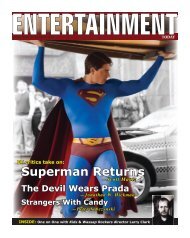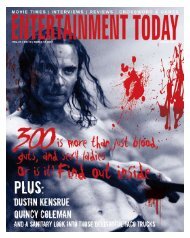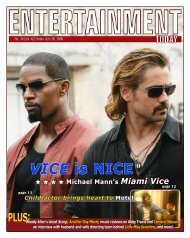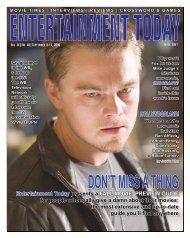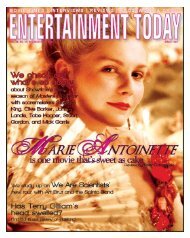LOVE
this issue of Entertainment Today
this issue of Entertainment Today
Create successful ePaper yourself
Turn your PDF publications into a flip-book with our unique Google optimized e-Paper software.
to infamy as an associate of Carlos “The Jackal,” and onto<br />
his contemporary humble existence as a farmhand.<br />
This interesting material includes archival footage from<br />
the 1975 terrorist event in Vienna where Klein and others<br />
led by the Jackal took hostages including many OPEC<br />
ministers. Klein was injured, but escaped and avoided<br />
capture for some 25 years until he turned himself into<br />
the authorities in an effort to find what he calls a “legal<br />
existence.” With chilling frankness, Klein discusses his<br />
life as a terrorist. Sometimes, his comments are amusing,<br />
such as when he talks about Yemen terrorist training<br />
camps. “What good is it to train the potential terrorist to<br />
carry and use a heavy machine gun?” he jokes. “In the city,<br />
such a skill would be useless. After all, carrying a heavy<br />
machine gun around in a normal city would probably be a<br />
dead terrorist giveaway.” Other times, Klein’s comments<br />
are sobering, especially when he describes the 1975<br />
event in Vienna, and refers to the sum of the deaths as<br />
“murders.” He’s honest when he uses the word “murder.”<br />
Klein acknowledges that he was exploited, and that his<br />
idealism morphed into something dark and violent.<br />
While not an entertaining and splashy documentary, My<br />
Life as a Terrorist gives us a peak at what causes a smart<br />
and passionate man to become violent and evil. ( JH)<br />
The Last King of Scotland<br />
Directed By Kevin Macdonald<br />
Cast: Forest Whitaker, James McAvoy, Kerry<br />
Washington, Simon McBurney, and Gillian Anderson<br />
Why did Idi Amin, Uganda’s ruler from 1971 to 1979,<br />
murder something like half a million of his fellow<br />
citizens? And why did he, at one point, anoint himself<br />
“the last king of Scotland?” Kevin Macdonald sheds<br />
some light on the subject through the eyes of a young<br />
Scottish doctor who becomes close to Amin in the early<br />
part of his bloody rule.<br />
The Last King of Scotland is a brutal and beautiful film.<br />
It is a movie that looks at one of Africa’s most feared<br />
and terrible leaders from the inside. The film shows the<br />
romance of a charismatic president and his intoxicating<br />
effect on those around him. Cleverly, we get a front row<br />
seat when young Scottish doctor Nicholas Garrigan<br />
( James McAvoy) is brought into Amin’s inner circle to<br />
become his closest advisor. This position, thrust upon<br />
the idealistic Garrigan, might be too much for him to<br />
handle.<br />
While McAvoy (who played the goat-eared Mr. Tumnus<br />
in The Chronicles of Narnia: The Lion, the Witch, and the<br />
Wardrobe) is very good here, this is Forest Whitaker’s<br />
film. He devours the role of Amin as few could (although<br />
Yaphet Kotto seemed right for the character in Raid on<br />
Entebbe). Whitaker is both beguiling and downright<br />
scary. No doubt, he is on the short list for Oscar.<br />
My problem with the film is that its focus is a little too<br />
much on the young doctor. This leaves Amin as a character<br />
who drops in and out of scenes to charm, intimidate, and<br />
horrify. This had to be tricky for filmmaker Macdonald,<br />
because Garrigan is a character that most in the audience<br />
can relate to, and it is also one that weakens the narrative<br />
enough to make Amin’s reign of terror less important<br />
than Garrigan’s survival. And this is complicated by a<br />
love affair between Garrigan and one of Amin’s youngest<br />
wives.<br />
Still, had the film focused exclusively on Amin, I don’t<br />
think audiences could have taken its powerful vision.<br />
And the device used to tell a part of ruler Amin’s story,<br />
that of Garrigan’s perspective, does manage to make a<br />
powerful one, at that. ( JH)<br />
Venus<br />
Directed By Roger Michell<br />
Cast: Peter O’Toole, Leslie Phillips, Jodie Whittaker,<br />
Vanessa Redgrave, and Richard Griffiths<br />
Peter O’Toole is just amazing in Venus, a graceful and<br />
finely crafted little film that will weigh in heavily around<br />
Oscar time. Director Roger Michell re-teams here with<br />
writer Hanif Kureishi (My Son the Fanatic). The duo<br />
made The Mother, that, I will admit, I haven’t seen. That<br />
film, according to Kureishi who I got to talk to, involved<br />
a sexual relationship of a man (played by new Bond<br />
Daniel Craig) with a much-older woman. Where The<br />
Mother was controversial, Venus is likely to be received by<br />
mainstream audiences.<br />
In Venus, O’Toole plays Maurice, a British actor of some<br />
note now pretty much relegated in his old age to playing<br />
corpses on soap operas. His friends are actors, perhaps<br />
of lesser stardom, who now sit around in their old age<br />
drinking coffee and reading obituaries. But when one<br />
of Maurice’s friends, Ian (Leslie Phillips), is visited by<br />
a young niece, Jessie ( Jodi Whittaker), Maurice notices<br />
something within her that long since left his life. Ian<br />
complains bitterly about his Jessie who has moved in<br />
to help him around his living space. We first meet her<br />
sulking around the apartment and eating something<br />
indescribably disgusting from a microwaveable plastic<br />
cup. Maurice has come to Ian’s place to take him to the<br />
theater, and when Ian proves to not be up for the trip,<br />
Maurice takes Jessie along. From here, an odd mentorship<br />
begins—albeit begrudgingly, at first—for Jessie who one<br />
would think is far too hip to be seen out on the town with<br />
such an old man. But after the play, she takes Maurice<br />
to a club, and drinks far more than she should. In the<br />
cab ride home, Maurice comforts the girl lovingly. A<br />
relationship of some sort has begun.<br />
Venus is so well written. Writer Kureishi has a good<br />
grasp on his characters, both young and old, especially<br />
that of Maurice. But the film might not have generated<br />
the kind of buzz it is receiving had it not been for the<br />
pitch-perfect performance by the 74-year-old O’Toole.<br />
Long one of my favorite actors, O’Toole, in a rare lead<br />
role, manages to occupy most every scene, and is the film’s<br />
focus even when the performances of those around him<br />
are equally wonderful. O’Toole does something special<br />
with his eyes as they relate to us that he’s a much younger<br />
man beneath the aged exterior. In one scene, his Maurice<br />
apologizes, I think, to his estranged wife (played with<br />
careful moppet understatement by Vanessa Redgrave).<br />
Sitting at a kitchen table, Maurice leans in close to her<br />
placing his head on her shoulder lovingly, and—in so<br />
doing—tragically conveys a lifetime of regret that he<br />
now wishes to admit. But, the regret is not necessarily<br />
negative. Maurice has lived a long enough life that the<br />
past indiscretions have lost their negative punch.<br />
New-comer Jodie Whittaker plays Jessie well.<br />
Her<br />
character much transforms from a girl into a woman.<br />
This loss of innocence is much more than sexual: it is<br />
emotional and an experience that benefits from the life<br />
lessons of her elderly admirer. Whittaker’s performance,<br />
like all those in the film, no doubt was elevated due to<br />
presence of O’Toole.<br />
Notwithstanding, Whittaker<br />
is independently good here in a role that will get her<br />
noticed.<br />
Venus is one of the best films of the festival. ( JH)<br />
Stranger Than Fiction<br />
Directed by Marc Forster<br />
Cast: Will Ferrell, Maggie Gyllenhaal, Dustin<br />
Hoffman, Queen Latifah, and Emma Thompson<br />
Director Marc Forster can do anything. Here, he makes<br />
an eclectic film with an even more eclectic cast. And<br />
Stranger Than Fiction is awfully good stuff.<br />
Harold Crick (Will Ferrell) is an IRS agent who is stuck<br />
in a routine. He is obsessive about numbers, as he counts<br />
and crunches them in his head constantly. He lives alone<br />
in an antiseptic apartment comforted only by his ordered<br />
existence and, above all, his wristwatch. One day, while<br />
he brushes his teeth in a characteristically methodical<br />
manner, he hears a voice in his head. It is a voice that<br />
narrates most everything of his daily regiment. And for<br />
both us in audience and Harold on the screen, the sudden<br />
presence of narration is unnerving.<br />
Unknown to Harold, the narrator’s voice is that of<br />
novelist Kay Eiffel (a never-better Emma Thompson).<br />
She is experiencing writer’s block. And in movie fashion,<br />
her publisher has shipped over an assistant (a perfectly<br />
restrained and refined Queen Latifah) who specializes<br />
in fixing blocked writers. The problem Kay has is that<br />
she cannot figure out how to kill the subject of her latest<br />
novel.<br />
She’s unaware that “her character”—Harold<br />
Crick—is actually alive both on the page and in real life.<br />
Stranger Than Fiction is more than a comedy. It is funny,<br />
yes, but equally insightful. The film utilizes a bit of<br />
animation to illustrate Harold’s obsession with numbers<br />
that is both as fascinating as it entertaining. As he walks<br />
around the city, we see literally his numeric thoughts<br />
that calculate percentages, length, values. It reinforces<br />
Harold’s sterile existence but, at the same time, makes<br />
him unique and interesting.<br />
When, as an agent of the IRS, Harold must audit a baker<br />
named Ana (Maggie Gyllenhaal), he is instantly taken<br />
with her, and the numbers become less important. The<br />
voice continues and reveals that his death may be more<br />
imminent than he’s ready to accept.<br />
Stranger Than Fiction pulls the odd story-lines (of the<br />
IRS agent, the baker, the writer, and a professor) together<br />
marvelously, and never makes a misstep. ( JH)<br />
OPERA JAWA<br />
Written and Directed<br />
by Garin Nugroho,<br />
Central Java is Moslem. This is important to know<br />
because otherwise this film would be totally incoherent.<br />
Come to think of it, it doesn’t matter, as the film is<br />
incoherent anyway. It’s one of those pieces that doesn’t<br />
translate, which is a pity, as it’s clear that Garin Nugroho<br />
is proud of his country’s cultural heritage. This is fine,<br />
but telling a story is important, too.<br />
The film is a musical film adaptation of the Ramayana, a<br />
classical epic hugely popular in countries influenced by<br />
Hinduism. Java used to be Hindu and Buddhist before<br />
the Moslems got there, and their literature managed to<br />
survive the mass conversions of the 15 th century, mainly<br />
as the subject of shadow puppet shows and dances in the<br />
“gamelan” tradition. If you don’t know what this is, you’ll<br />
know it when you see the film.<br />
The story is about a happily married couple named<br />
Siti (Aritika Sari Devi) and Setyo (Martinus Miroto).<br />
She’s a housewife, he’s a potter. It seems that the Evil<br />
Ludiro (Edo Supreiyanto) has the hots for Siti, and uses<br />
his magical powers to abduct her, leading to all sorts of<br />
nastiness.<br />
Only, we don’t know how he does it—it’s something to<br />
do with wicker cones—but other than that, it’s all one<br />
unexplainable mess. This, despite the introduction that<br />
who leaves immediately, never to return—claims to have<br />
extricated “the truth.”<br />
Cultural quirks like Moslems [who officially hate pig<br />
livers and should have nothing to do with them, nor the<br />
rest of the animal] reading animal entrails don’t exactly<br />
endear us to the veracity of the story, nor the lack of<br />
characterization for all but the villain who seems to be a<br />
mama’s boy with megalomaniacal intentions.<br />
Not that it matters much, because the damn thing<br />
is so confusing that if you don’t know the entire story,<br />
you won’t make heads or tails of it whatsoever. Getting<br />
confused isn’t why we go to the movies. (EL)<br />
Dark Blue Almost Black<br />
Directed By Daniel Sánchez Arévalo<br />
Cast: Quim Gutiérrez, Marta Etura, Antonio de la<br />
Torre, Héctor Colomé, Raúl Arévalo, and Eva Pallarés<br />
From Spain, DarkBlueAlmostBlack is a terrific debut<br />
from writer/director Daniel Sánchez Arévalo. The story<br />
concerns Jorge (Quim Gutiérrez) who lives with and<br />
cares for his disabled father (Héctor Colomé). Like his<br />
father once had, Jorge works as an apartment building<br />
janitor. Unlike his father, Jorge has gone to college and<br />
has designs on a job in which he will wear a suit (hence<br />
the film’s title).<br />
Jorge’s brother, Antonio (Antonio de la Torre), is cooling<br />
his heels in jail. This jail has a theater program of some<br />
sort in which female and male inmates participate. This<br />
is where Antonio meets Paula (Marta Etura) and strikes<br />
up what appears to be an immediate sexual relationship.<br />
She likes Antonio because he doesn’t have tattoos.<br />
For Jorge, a recent college graduate, the job search is now<br />
in full swing. He goes on interviews and gets rejections.<br />
Meanwhile, at home, he cares for his father whose mind<br />
and body have been damaged greatly by a stroke. The old<br />
man remembers things and occasionally recognizes Jorge,<br />
but he is completely dependent on Jorge for his survival.<br />
Soon, an old love will return, Antonio will make parole,<br />
and Paula will meet Jorge within the walls of the jail.<br />
This is a film that skirts cliché in favor of humanity and<br />
maturity. Sometimes, to find one’s true love or place in<br />
the world, it is necessary to look objectively at where you<br />
are in life. Jorge comes to understand where he must be<br />
and what he must do, a clarity that rarely comes to the<br />
vast majority of us. DarkBlueAlmostBlack is about many<br />
shows us clearly the pig liver from which the narrator— things: sex, love, but most of all, responsibility. ( JH) P<br />
|21|<br />
SEPTEMBER 15-21, 2006 ENTERTAINMENT TODAY



